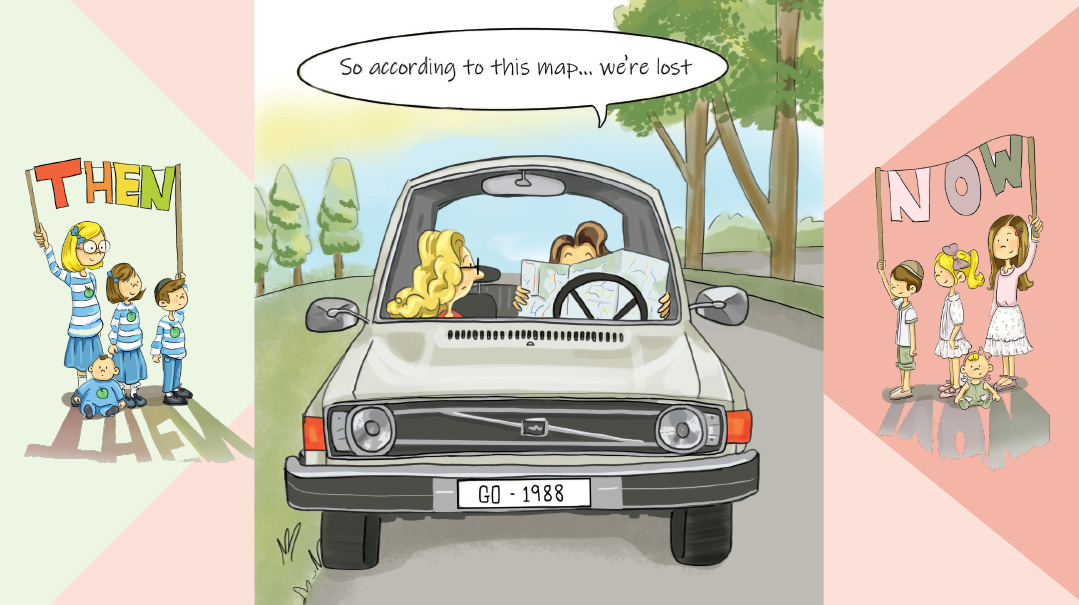Bye-Bye Sibling Rivalry
| July 11, 2023Parenting expert Mrs. Rivka Levitansky gave four mothers six strategies to tackle squabbling siblings. Here's what happened

Not too long ago, when my friends would lament to me about how often and intensely their children fought with each other, I’d murmur empathetic responses, but deep inside, I’d thank Hashem (maybe a little smugly, if I’m being honest) that my children really got along quite well.
But gam zeh yaavor, and after one particularly grueling day of seemingly nonstop bickering, I’d had enough. I needed more than just my improvised ideas or tips from parenting books, so I turned to Mrs. Rivka Levitansky, of Positive Parenting courses, whom I knew both from taking her course in the past and also from when she lived in Cleveland. Over the course of our conversation, she gave me six strategies to try out. And because it’s always more fun to do things with friends, I reached out to some mothers I know and asked if they’d like to try this out with their kids, too.
Once I had my volunteers, I sent them each an email with a write-up of those six tips. We all tried them out during the week of Shavuos, and after the week was up, each mother wrote up how it went and sent it to me.
Here are the brave participants:
Adina from Rhode Island has children ranging in age from 6 to 18, all boys. My biggest sibling rivalry challenge is when my boys get physical with each other. In the past when they fought, I would try to talk it out with them, but in the moment when everyone is so worked up, it doesn’t help. I’m hoping to learn some new techniques for dealing with the fighting more effectively!
Tova from Cleveland, has a bunch of boys and one girl, ranging in age from 7 to 17. Throughout the years, different sets of my kids have fought, and currently it’s my youngest two. These two boys seem magnetically attracted to each other. They will davka sit on the same couch just so one can smack the other one.
Shevy from Baltimore has girls ranging in age from 3 to 17. Since I only have girls, most of the fighting in my house is verbal. It’s so difficult when my daughters dig into each other with mean comebacks after each comment, because I know that if just of one of them were to remain quiet, the conflict would end, but it just keeps going on and on!
Rivki My children range in age from 4 to 14, a mix of boys and girls. Some of my younger children really push the buttons for some of my older ones, and I feel torn between empathizing with the annoyed kids or defending the ones doing the annoying. Mostly, I end up getting annoyed that they’re fighting!
A Tale as Old as Time
Strategy #1 — Take A Deep Breath
IF you feel your blood pressure starting to rise when your children are fighting again, try to step back from the situation. Remind yourself that it’s normal for children to fight. No one likes it, but it’s a regular part of family life, and it’s part of tzaar gidul banim. You’re not alone.
“It’s definitely something we all have to live with, because sibling rivalry has been here from time immemorial,” says Mrs. Levitansky. She reassures me that it’s not as if there’s something wrong with my children or my parenting. “It makes mothers crazy. I remember it used to make me crazy, too,” she shares. “But it’s a normal part of raising children.
“Calmness and confidence is such a big piece of it,” says Mrs. Levitansky. “Kids are going to complain, and if a mother has a mindset that it’s okay, that makes it easier.”
She notes that of course no mother is able to always hold it together, but this knowledge should hopefully make it easier.
Adina: This “technique” definitely helped me. Not sure how much it helped my boys, but taking a deep breath and trying to “ground” myself before dealing with their antics made a difference. When I was calmer I (obviously) had an easier time doing whatever needed to be done at that moment.
Tova: During Kiddush on the first night of Shavuos, two of my boys got into a fight because the older one accidentally hurt the younger one with a “friendly punch.” We sat there while the seven-year-old punched and punched him with as much power as his little fists could muster, trying not to laugh at how cute it was. It was sad in a cute way or cute in a sad way, because the seven-year-old was just so mad and so tiny, but he clearly wasn’t hurting his older brother.
I gave a quick reprimand to the older one to, for heaven’s sake, keep his hands to himself, and a reminder to the younger one, that even though he was mad (empathizing), he still couldn’t hit his brother. The general tone at the table, though, was calm (except for the seven-year-old), which I think comes from the first technique of taking a deep breath and putting it in perspective. I knew I didn’t need to panic, and that there was no need to escalate the tension by getting upset. I find that if I keep my emotions out of it, the situations die down so much faster.
Shevy: On Tuesday morning, some of my kids woke up on the wrong side of the bed, which usually leads to everyone else in the family being on the wrong side of the house. The snapping at each other started as they rushed to find their things to make it out the door on time. I felt myself getting annoyed that this was now how my morning was starting, listening to their less-than-nice comments to each other.
Normally I would intervene with a quick, “Come on, focus on what you need to do and let your sister focus on what she needs to do,” but today I just took a deep breath and reminded myself that sibling fighting is normal. I also reminded myself that I’m not the only mother starting her morning off in a less-than-pleasant way, and that invisible camaraderie gave me some chizuk. After a few more snappy comments between my kids, they moved on to laughing with each other as they ate breakfast, and I laughed to myself as I tried to make a mental reminder that I don’t need to take my role as a policewoman so seriously all the time.
Let Them Learn
Tip #2 — Walk Away
You don’t have to get involved. They can learn to work it out themselves. (This is obviously assuming no one is in real danger!) If you need to leave the room, do that.
“A lot of the time, kids can work things out on their own,” Mrs. Levitansky says. But “If you’re in the room, and they’re going to start hitting each other, you can’t let kids hurt each other in front of you.” She suggests that if you’re in the room and they start to fight, discreetly leave.
Letting them figure it out on their own helps circumvent the undesirable situation of taking sides. Mrs. Levitansky says that, “A lot of times when kids fight, number one, they want their mother’s attention. They also want it to prove that they’re right. If they were right last time, they want to be right again the next time. If they were wrong last time, they for sure want to be right this time.”
Adina: This didn’t work out so well. I think it made my boys even angrier (at me and at each other). There was an expectation that I was going to help out in some way (either mediate or just empathize), and they were angry when I didn’t — I think they actually felt neglected!
Tova: This is already my default strategy. My boys play a ball game that they named Argue-ball (I promise I’m not making this up!). They also have one called Ouch. (I thought it was called “Outs,” which sounds so much more pareve, but no, they corrected me — it’s actually called Ouch.) My husband says this is part of little boys growing up, but omigosh. Drives me bonkers. No wonder my default is to ignore it and hide in the kitchen. (For some reason, nobody bothers me while I’m doing dishes. Too bad I hate doing dishes.)
Rivki: Monday was a very hectic day, more so than usual, and by the time my kids came home, I was already wiped, and in no state to tolerate any bickering. After taking many, many deep breaths, I saw I wasn’t able to keep my mouth shut, so I took a nice walk about the block.
Instead of feeling exclusively like, “I’m escaping the madhouse because I can’t cope with it,” I was able to reframe my leaving as, “I’m taking Mrs. Levitansky’s advice and employing a good parenting strategy right now!” which made me feel better all around, and I returned home in a much better mood. By the time I got back home, the situation had settled into the regular evening routine (hectic but tolerable). Zero injuries had occurred in my absence!
You’re Switzerland
Tip #3 — Empathize
IFyou see that you have to get involved, don’t try to figure out who caused it. Don’t say, “Why’d you hit your sister?!” etc., but try to empathize with both children, one at a time. “Oh, you’re so frustrated? Your brother is bothering you? He’s not sharing? That’s so hard.” When the other child inevitably chimes in saying, “That’s not what happened!!” You can tell him, “I’m going to listen to you soon, and then you can tell me what happened, too.” No blaming, just curiosity.
When kids come running to you with a claim of injury, the first thing to do is to acknowledge the injury and then try to distract them. But sometimes the child demands restitution, which means hearing each side of the story, keeping in mind that each child is giving over his or her own (usually conflicting) perspective.
Mrs. Levitansky urges mothers to avoid the temptation to get to the bottom of things, and stick to empathizing. Empathizing doesn’t mean talking negatively about the alleged perpetrator, or determining the truthfulness of the accusation. It means meeting the child in their current reality.
Rivki: When one of my daughters came to me wailing that her sibling had hurt her (it was an invisible boo-boo), I leaned deeply into empathetic mode. Fortunately for me, the children were in separate rooms, so I was able to give them each their own empathy in relative peace (one was shouting from the other room but it was manageable enough). And then I took the opportunity to distract my daughter by offering a chance to help bring something to the table, which worked like a charm.
Adina: This was a great technique. Both boys felt like I was on their team — even though I was neutral! It had to be said in a way that’s not patronizing, which I found can be kind of tricky.
Shevy: One afternoon my kids were fighting about whose mess was taking over the dining room table. Later, when one of my kids came to vent to me about how much it bothered her that her sister always left her things everywhere, I just empathized with how frustrating that is for her, knowing how much she values a clean and orderly environment. I didn’t at all address the conflict between them. It actually took a lot of self-restraint on my part not to move into problem-solving mode after the empathy, but I did it!
Room for Improvement
Tip #4 — Come Up with a Solution
After everyone has calmed down, ask your child what he or she could have done differently. “Your sister took your brush without asking. You were so mad! Instead of shoving her or calling her names, what’s a different choice you could have made?”
After empathizing, the next step is to encourage the children to brainstorm on how things could have played out differently. “You could offer to give them each money for soda or pizza or something desirable if they come up with an idea on how they could have handled the whole situation differently,” suggests Mrs. Levitansky. “Then you’re getting their brains thinking of how they could have been in the same scenario and come up with different results.”
This isn’t something that can be done every time they fight, but if a mother sees an opportunity to employ this strategy, she should take it. “Maybe you don’t have to offer them anything, but some kids need the incentive, and if you offer them something, they’ll be more willing to think of a solution,” she says.
Adina: This didn’t work so well with my ten-year-old. He was like, “Duh. He broke my Lego airport. Of course I was mad. I could have punched him instead of hitting him.” I think the trick to this technique is not to sound patronizing, which is really challenging. I wasn’t successful with this, but I could practice more and see how it goes.
Rivki: When I tried this with one of my younger children, he simply came up with more inventive ways to cause injury. But I persevered, and he (grudgingly) acknowledged that if his siblings were annoying him and not respecting requests to stop whatever annoying action they were doing (breathing, sitting, existing), he could come ask me for help instead of resorting to violence.
Shevy: On Erev Yom Tov, my girls were fighting about who was helping with what and when. Normally when this kind of squabbling happens, I intervene because I don’t find any help helpful if it comes with fighting! But instead of getting involved, I used the “walk away” technique.
Later on, I was able to sit down with them and try to come up with a solution for when this inevitably happens again. I thanked them for helping with the Yom Tov prep, but asked if they would have felt better about helping if they could have divided up the tasks in a more pleasant and friendly way. I helped them through their conversation, reminding them to use “I” statements, until they could each express what they needed from each other in order for everyone to be happy, and they figured it out!
Naming the Experience
Tip #5 — Give Them the Words
When you see your child acting out in frustration, help her name what’s going on. “You’re so frustrated, you don’t want to share, you need personal space,” whatever it is.
“We could teach kids to use their words instead of smacking their sibling right away,” Mrs. Levitansky says. It is, as with most of parenting, a process. “A lot of it is teaching, teaching, teaching, especially when they’re younger.” It’s our job to give them the words, and to let them know that if their sibling doesn’t listen, we have their back.
In addition to encouraging them to use their words instead of their hands or feet, a parent can also give the child the words to express the emotions she’s feeling. If there are siblings in the house who have additional challenges like excessive impulsivity, or a more difficult nature, a parent can give the other children words to express their feelings of frustration or annoyance.
Adina: This kind of worked. When I gave one of my kids a vague word (usually: angry, sad, or frustrated), it definitely helped him feel more trusting of me, and helped build a bond between us, but it didn’t actually decrease the fighting. It did help people calm down afterward, though.
Rivki: I’ve gotten into the habit of doing this with my four-year-old, so it was relatively easy to try this one out (though obviously with my older children I had to tailor the sentence so as not to sound like I was talking to a four-year-old). When one of my younger sons was complaining that his oldest brother had more freedom than he did, I first empathized with him and then named some of the feelings that he felt (frustrated, sad, angry), and while it didn’t solve his problem, it was a pretty successful conversation overall.
Tova: Yesterday one son smacked another son and then said, “I bet you won’t play ball with me now.” Since I know that smacking is his way of engaging his brother, and was able to translate that into normal-person-speak, I took the opportunity to use the “give him words” tool. I mildly pointed out to the ten-year-old that he wouldn’t like it if someone smacked him, and if he really just wanted his brother to play with him, why doesn’t he just ask him? Why he doesn’t already know this is beyond me, but whatever, I’m the mom, and it’s my job to teach these life skills.
So after that prompt from me, he did ask his brother if he wanted to play ball, and off they went to play. I consider that a win, though I wonder how many more times I’ll have to prompt him before his default engagement tactic isn’t smacking… will it be before his bar mitzvah?
Let’s Be Nice
Tip #6 — Increasing Derech Eretz
Okay, so this one isn’t really for when the kids are fighting, but it’s something you can do anytime, all the time (and I’m sure you’re already doing it! But maybe there’s still room for improvement). When we work on being regulated ourselves when we’re feeling frustrated, and speaking to everyone with derech eretz, whether it’s to a tantruming kid or a husband doing that thing that you wish he would just stop already, that kind of modeling will trickle down and help the home environment be a calmer place overall.
So much of what kids learn is just by osmosis. When a mother is calmer, and when she talks with derech eretz to her husband and her children, automatically the household will be calmer. “That doesn’t mean there won’t be fighting,” says Mrs. Levitansky, “but there will be less fighting, and it will certainly help in raising more respectful children.”
When a mother is able to be calm and confident most of the time, it provides a sense of security for the children. They see that even though they’re fighting or yelling, their mother isn’t losing it, which means it’s not so bad. “An overwrought reaction to fighting can lead a child to think they’re too much to handle, which is a scary thought for a child,” she says.
Speaking with derech eretz means also avoiding a common cause of sibling rivalry, which is comparison. Comparing a child to a neighbor or other non-related children is painful, but comparing to a sibling is very damaging. “Hashem doesn’t compare us to anybody else. He compares us to ourselves. Even if a word of critical comparison is on the tip of the mother’s tongue, she should bite her tongue, which is anyway a good thing that mother should do more often,” says Mrs. Levitansky. She acknowledges that mothers often share criticisms or comparisons in a desire to be helpful, but the reality is that it’s destructive.
Adina: I’m still working on this. You didn’t expect to see results in one week, did you? I love reading my kids stories, and any books that are able to give over these lessons in an engaging way are top on our list.
Tova: I took my kids to a petting farm, and while we were there, my two younger boys were involved in some mild verbal sparring (only verbal sparring and not physical because they were, thankfully, restraining themselves in public). It occurred to me that this might be a good time to increase derech eretz. I pointed out very casually that responding to this kind of talk was beneath the ten-year-old, and that the seven-year-old should probably know better than to speak that way. I kept the tone light, conversational and nonemotional, and then I distracted them by pointing out the farm animals. The kids really did well for the rest of the day because they were so interested in the animals, which kept them too busy to fight.
Rivki: This is certainly a lifelong avodah, but I’ve seen and hope to continue to see progress as I make my way through this middos challenge. I mainly tried to work on this by keeping my mouth shut and refraining from making biting remarks or offering “helpful” criticism. I grew up in a house full of fun sarcasm, and I love dry humor, but when it’s coming from a place of frustration, it veers too closely to onaas devarim, and that’s not funny at all.
Takeaways
“This article isn’t going to make life easy, but hopefully it will make it easier,” says Mrs. Levitansky. “And not everything works for everyone. Some things work for some people, but don’t work for other people. And sometimes, even if something works, that doesn’t mean it works all the time. One thing that does help for everyone is being in constant conversation with the Ribbono shel Olam. Even doing so in the nitty-gritty aspects of parenting, like asking for Hashem’s help in solving a fight, will give us the crucial siyata d’Shmaya that is so critical to the success of our children. When we are able to handle the inevitable fighting between young children, it will lead to beautiful sibling relationships when those children are grown up.”
Adina: My biggest takeaway from this was that the more I focused on them and the less I focused on other things, the less likely they were to fight. I consider myself pretty “good” about technology use — I don’t have a smartphone, I’m not on a gazillion group chats, etc., but I still love chatting on my flip phone, checking my email at my desktop, etc. I found that the more I focused on my kids and the less time I spent doing other things, the less likely they were to fight. Obviously, I still need to cook dinner, fold laundry, and wash dishes, but it made me think about what I spend time doing in the afternoon hours and on Shabbos that I could do differently. For example, instead of picking up a book, I could start to work on a puzzle, and whoever wants to join me can do so. I’m not saying I actually have done that yet, but I do think it would be helpful.
Tova: It’s interesting, now that I’m hyper-focused on the fighting, how little of it there really is. I would say that every day there’s at least one altercation, but when I really am mindful of what’s happening, these fights are over in a matter of seconds. Minutes, at most. I’ve become more mindful of times when the boys are actually getting along, something I gave little attention to in the past. It was like I had in my head that these are the two who are fighting, and they’re always fighting, and we just have to get through this time in their life until they grow up. But really noticing and being present made me realize how many things are already going right.
One other thing I noticed is that the fighting almost always comes when there is some sort of lack (e.g., one is tired, hungry, bored, frustrated, mad about something else, etc.), and that when the kids are occupied and emotionally stable, that cuts down on the fighting dramatically.
Shevy: My overall takeaway is that kids fight. That’s part of what they do. When parents constantly step in, it’s a little bit like denial of reality and rejecting the facts of life. And also, when we step in all the time, we move from mother to policewoman or referee or boss or screamer or tension-maker, and that makes us a person they hate. That’s not a great role for us to be in. So reminding myself of the normalcy of all this, and accepting it as a part of life, helped me move from being reactive to being intentional. It also helped me move toward focusing not on their behavior and emotional regulation, but on my own (which is the only thing I can really control anyway).
Rivki: This project didn’t make my kids stop fighting (no spoiler alert needed there), but it did help me shift the way I thought about their arguments. Even just the simple reminder that this was a normal part of raising children was tremendously calming, which of course, led to more effective reactions on my end. Instead of just always being in reaction or survival mode, I felt more equipped to actually parent.
Peace and Harmony
Rivki: It’s been a month since we tried out these techniques, and I have seen a difference in the way I react when my children start fighting. I no longer tense up like I used to, and instead of seeing it as a reflection on some sort of parenting failure on my part, I view it as part of tzaar gidul banim, and that helps me parent more effectively, from a place of intentionality instead of from fear or reaction or shame.
Adina: The most meaningful thing I got from this is that the less I’m involved in other things while my kids are present, the better. When I’m in the middle of doing something else, like making lunches or trying to schedule an appointment, they are more likely to fight, and that’s just how it is. The more I can get things done when they don’t need me, the smoother things are going to go.
Tova: A month later, and I’m pleased to realize my kids don’t actually fight as much as I thought they did. Paying close attention for the duration of the project made me super aware of the number of fights they actually had (not that many) and the intensity (not really as intense as I originally thought). Sometimes it pays to take a step back and actually collect data. It will challenge some of your beliefs and assumptions. (Or maybe it will confirm your worst thoughts. But we don’t have to go there.)
Shevy: Now that it’s been a month since I did this project, I see how a lot has become instinctive. I no longer rush to break up an argument; instead I turn inward and take a deep breath. I no longer run toward the conflict; I retreat a few steps away to take some space to myself. I don’t rush to offer problem-solving tips, but I provide empathy when listening to their complaints.
(Originally featured in Family First, Issue 851)
Oops! We could not locate your form.







